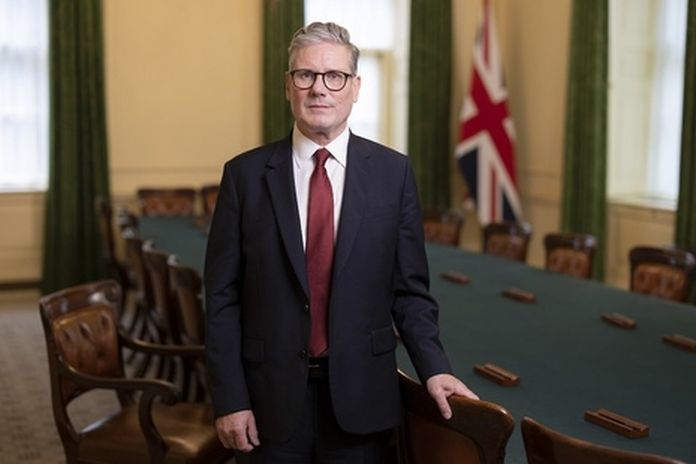
Border Security is at the heart of the Government’s reset with Europe, the Prime Minister told world leaders at a major European summit on Thursday 18 July.
The Prime Minister told the meeting of the European Political Community that he believes the magnitude of compounding challenges facing Europe cannot be solved alone, and that countries must work collectively to deliver solutions that rebalance the equation.
That will start with the UK taking a more active and greater convening role on the world stage, to strike genuine partnerships that have impact on people’s lives, he will say.
He added that the UK’s reset on the global stage will be rooted in upholding democratic values and international law and ensuring the economic and financial security of working people.
Setting out his first steps to improve the livelihoods of hardworking people, the Prime Minister announced the redeployment of more than 100 Home Office staff from the Migration and Economic Development Partnership (MEDP) and redeployment of them to a new rapid returns unit to take control of our borders.
The Prime Minister is also pledging to help lead the Europe-wide effort to combat organised immigration crime, and the people smuggling gangs trading in human lives, in co-operation with Europol, Frontex, and individual member states.
Irregular migration is a continent-wide problem, with more than 380,000 people believed to have entered the EU through irregular routes, an increase of 17% on the previous year. Around 41% of those arrivals are believed to have come in small boats across the Central Mediterranean, 26% on land through the Balkans, and 16% coming across the Eastern Mediterranean.
Prime Minister Keir Starmer said: We cannot let the challenges of the recent past define our relationships of the future. That is why European security will be at the forefront of this government’s foreign and defence priorities, and why I am focused on seizing this moment to renew our relationship with Europe.
The EPC will fire the starting gun on this government’s new approach to Europe, one that will not just benefit us now, but for generations to come, from dismantling the people smuggling webs trafficking people across Europe, to standing up to Putin’s barbaric actions in Ukraine and destabilising activity across Europe.
My government was elected with a mandate for change. I asked the British people to judge me by my actions, not words. This meeting of European leaders is an opportunity to push on and begin delivering on the people’s priorities. We will only be able to secure our borders, drive economic growth and defend our democracies if we work together.
Asylum decisions will be accelerated and, under the new fast-tracked system in the returns and enforcement unit, we will prioritise those who have no right to be in the UK and the greatest chance of being returned.
It comes after the government announced a Border Security Bill in the King’s Speech to tackle the criminal smuggling gangs, delivering on a key manifesto pledge. It will give the new Border Security Command counter terrorism-style powers to disrupt organised immigration crime and ensure smugglers can be prosecuted for preparatory offences such as supplying materials to facilitate organised immigration crime.
The new powers will build on the success of similar robust measures to counter terrorism and will include strengthening powers for law enforcement officers to investigate involvement in organised immigration crime.
The Home Secretary has already delivered a 50% uplift in NCA officers to be based in Europol with immediate effect and work is underway to further deepen our partnerships with Europol and its European Migrant Smuggling Centre.
Home Secretary Yvette Cooper said: Dangerous small boat crossings are undermining our border security and putting lives at risk. Criminal smuggling gangs are making millions out of small boat crossings.
We will work right across Europe to tackle this problem at source, going after those profiting from this awful trade and bringing them to justice.
The new Border Security Command will be a major step change in UK enforcement efforts to tackle organised immigration crime, drawing on substantial resource to work across Europe and beyond to disrupt trafficking networks and deliver justice.
At the same time, work is underway to transform the UK’s asylum system and accelerate decision-making, with a new returns and enforcement unit being set up in the Home Office to fast-track the removal of those with no right to be in the UK.
The EPC is the only pan European meeting of leaders, including the heads of the EU institutions, and for the first time at this EPC the leaders of NATO, the Council of Europe and the OSCE. The only European governments not invited are Russia and Belarus.
As well as focusing on the shared challenge of migration, the EPC will also convene leaders to discuss defending democracy and energy security through three working groups. The Prime Minister will attend the migration working group, alongside Italy, Albania, Germany, Malta, Denmark, Hungary, The Netherlands and Slovakia.
The Prime Minister is expected to host a number of bilaterals with key European leaders tomorrow, including Polish Prime Minister Donald Tusk. He is also expected to attend a meeting of the Moldova Group to underline Moldova’s sovereignty and democracy in the face of Russian interference.
Blenheim Palace is the birthplace of Churchill who stood up to a previous generation of aggression on European soil and was the inspiration for the Council of Europe which celebrates its 75th anniversary this year. The founding Treaty of London will be on show as the UK returns to its rightful place at the centre of European affairs.
Kindly follow us on twitter:@AfricanVoice2










